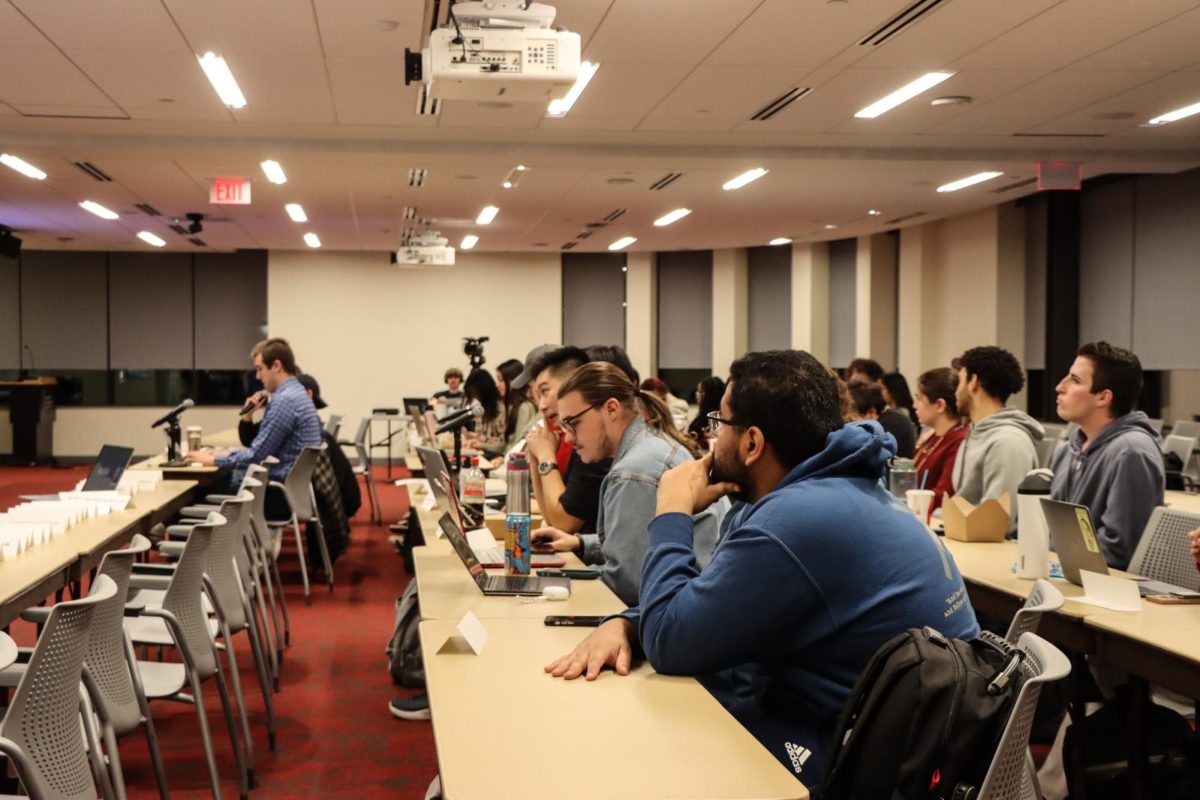A Nobel Prize winning mathematician drew such an audience that his talk almost never happened.
Somehow, the mathematical “genius” was allowed to go on with his lecture on “Ideal Money and Asymptomatically Ideal Money.”
John Nash, Nobel Laureate in economics, spoke at the Student Union Thursday afternoon. Nash’s public appearances have seen larger crowds since he was named Nobel Laureate.
The numbers multiplied further yet after Russell Crowe portrayed Nash in the 2001 Oscar-winner A Beautiful Mind.
“That movie,” Nash said wincingly.
Nash explained that he was a mathematician, never having served as a professor of economics. “I’m not exactly in the club,” he said. Nash is currently working in research at Princeton University in New Jersey as a mathematician. He said that his theories are very controversial and may not sit well among economics professors, particularly his attacks on Keynesian economic theories.
Nash also discussed his experience with paranoid schizophrenia, a disease that ended his time at the Massachusetts Institute of Technology in 1958.
“I guess I hadn’t felt sufficiently rewarded in the actual world,” said Nash. He described his schizophrenia as “almost an escape mechanism.
“It’s not simply painful,” he said.
Nash said that in his case, the initial effects of his condition put thoughts in his mind that did not exist in the real world. It wasn’t until the schizophrenia advanced that “voices” or auditory hallucinations became present.
“I became more important in this imaginary world,” Nash said. He said that A Beautiful Mind did well creating a fictional and artistic interpretation of his schizophrenia.
“Much of [the movie] related to true history and things that were fictional,” he said.
The University of Massachusetts Student Union Ballroom was filled beyond capacity twenty minutes before the start of the lecture. Environmental Health and Safety officials came close to clearing the room long before the lecture began.
Many of those who were shut out when the doors were ordered shut by EHS officials entered through back doors.
Nash was brought to the University as this year’s Philip Gamble Memorial lecturer, sponsored by the Economics department.
“I’ve been having big crowds lately with all the publicity,” Nash said. However, he wasted no time engaging in his lecture on a common form of “transferable utility” money.
“Money is the lubricant that enables the efficient transfer of utility,” Nash said. Nash focused on long term economic plans in relation to inflation.
According to Nash, over the average lifespan of 70 years, one dollar’s value would multiply four times from birth to “expiration.” Studying the changes of money in the short term does not allow for comparison to standards and inflation changes. Later, Nash said that it is too early to judge the success of the euro as a bloc currency.
Nash discussed the European Union and the introduction of the euro as a single monetary unit among the bloc countries of the union. Debt pardoning, he said, plays a role in governments that issue their own currency.
“The government that distributes its own currency pardons its own sins,” Nash said.
E.U. countries have a central controlling bank, similar to the U.S. Federal Reserve. Nash compared this central power based in Frankfurt, Germany, to the Holy Roman Empire.
Trade within country blocs compares to interstate trade in the United States, said Nash. He compared trade between the countries to catalogue shopping, where the only concern is sales tax from place to place.
Nash said that part of the appeal of joining government blocs, including the European Union, comes from the chance to reestablish currency systems, for example, the euro. Nash said that this represents his concept of Ideal Money.
“Membership in a social club is only desirable if there are non-members,” said Nash, referring to the E.U. countries.
Reestablishing a gold standard is not feasible, said Nash. The reasons for this revolve around the negative psychology around the mining of gold, despite advancements with cyanide mining techniques. Another factor is the psychology that hoarding gold in one location – Fort Knox – is a waste of labor.
Nash continues to research game theories of economics, some of his most famous work, and aspires to continue research as hard as ever. “I’m hoping to do good work. I don’t have limited ambitions.”






